Eczema Symptoms: Identification and Understanding
Identify eczema symptoms for tailored treatment. Effective medical solutions by Dexeryl.
What are the first signs of eczema flare-ups ?¹ ² ³
Atopic eczema, or atopic dermatitis, is characterized by a cyclical progression, alternating between recurring flare-up phases and remission periods where symptoms regress or disappear.
During flare-ups, three types of symptoms are observed
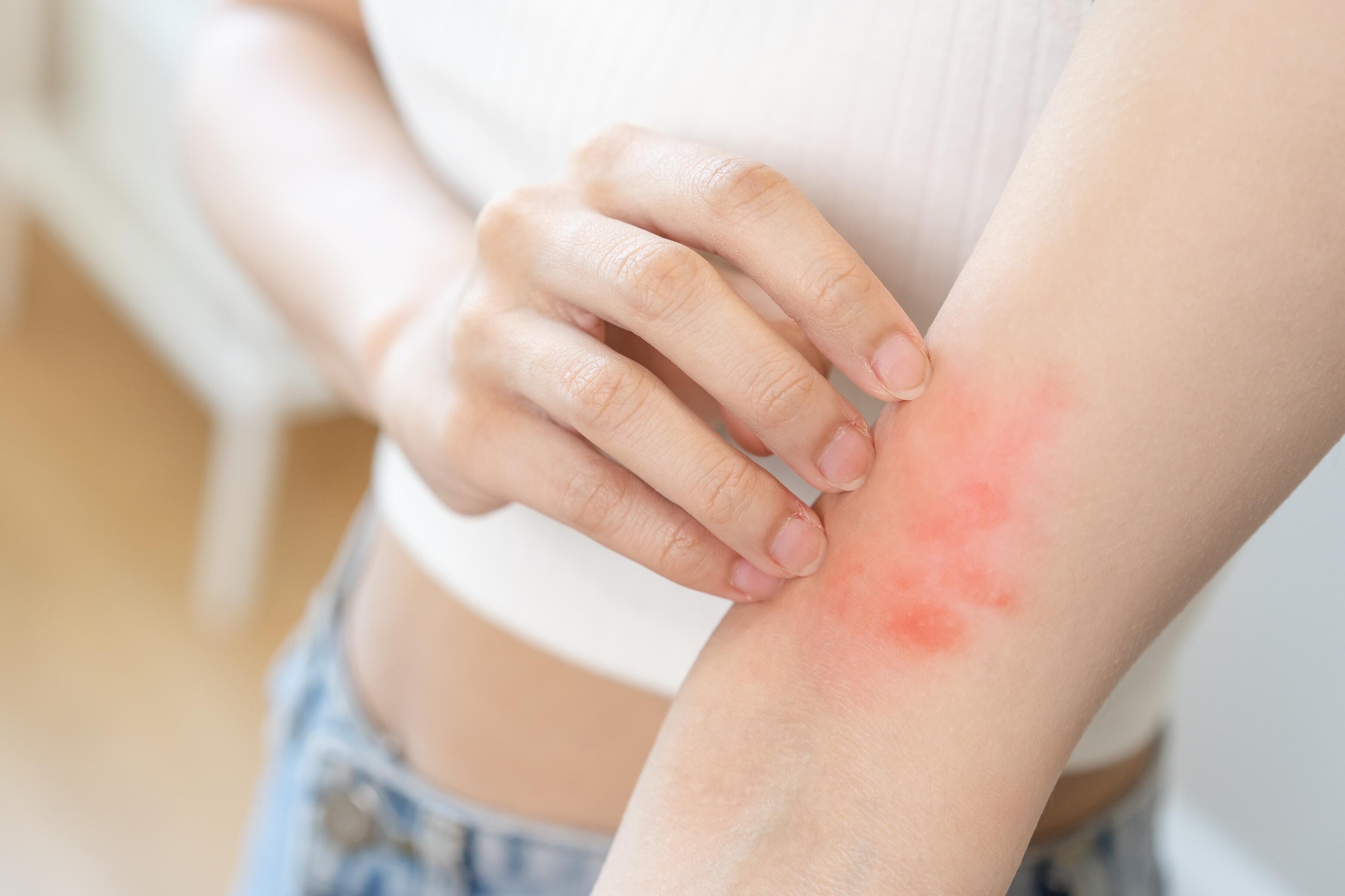
Itching or Pruritus
The most common symptom of eczema is itching (or pruritus). These sensations of skin inflammation, of varying severity, are often more intense during the night. Repeated scratching due to itching can worsen skin lesions and increase the risk of infections.
Eczema Skin Lesions
Eczema typically presents with characteristic skin lesions, including:
- Inflammation with reddened skin patches.
- These often swollen patches have a rough surface topped with small, fluid-filled bumps (vesicles).
- These vesicles ooze upon bursting spontaneously and form crusts as they dry.
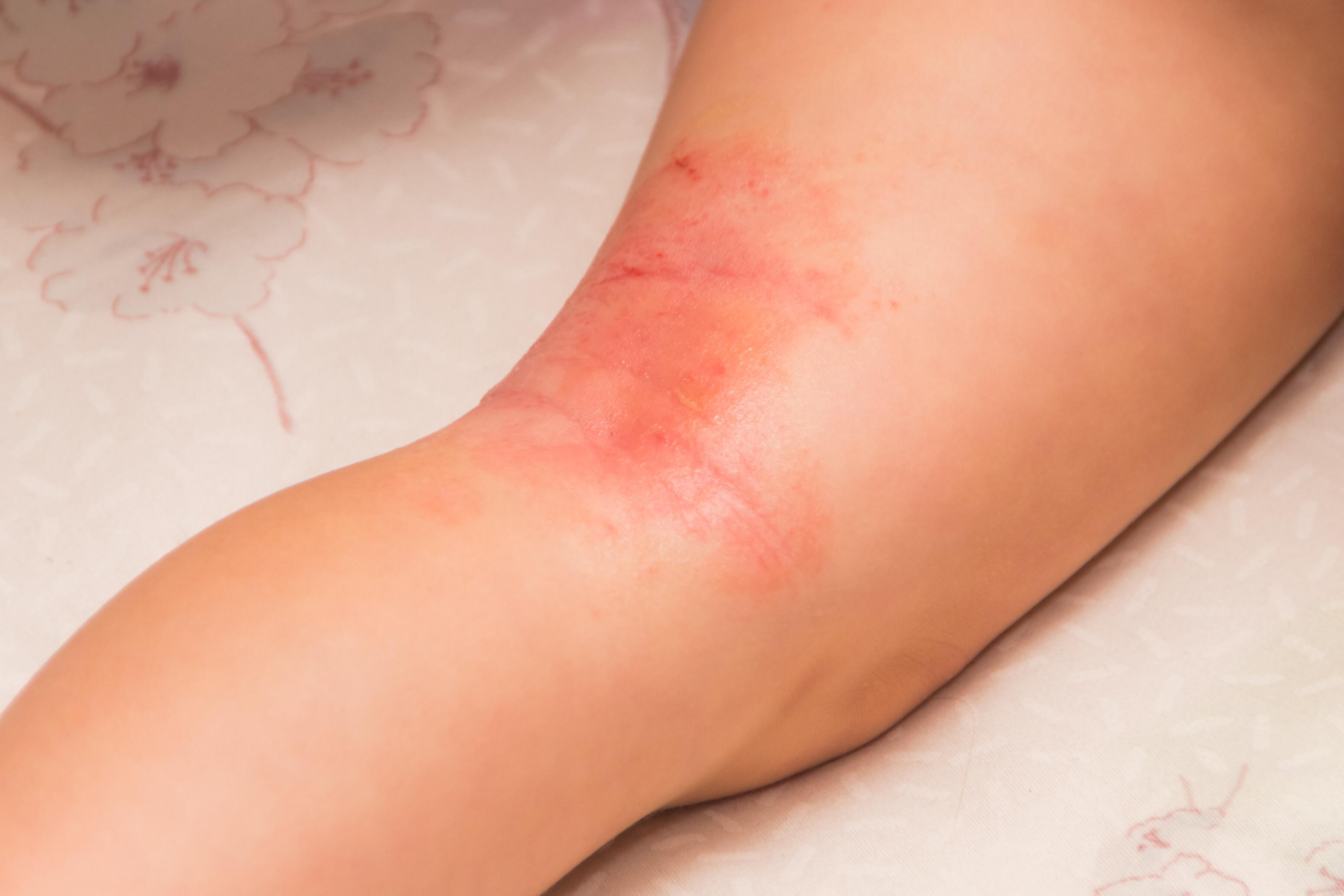
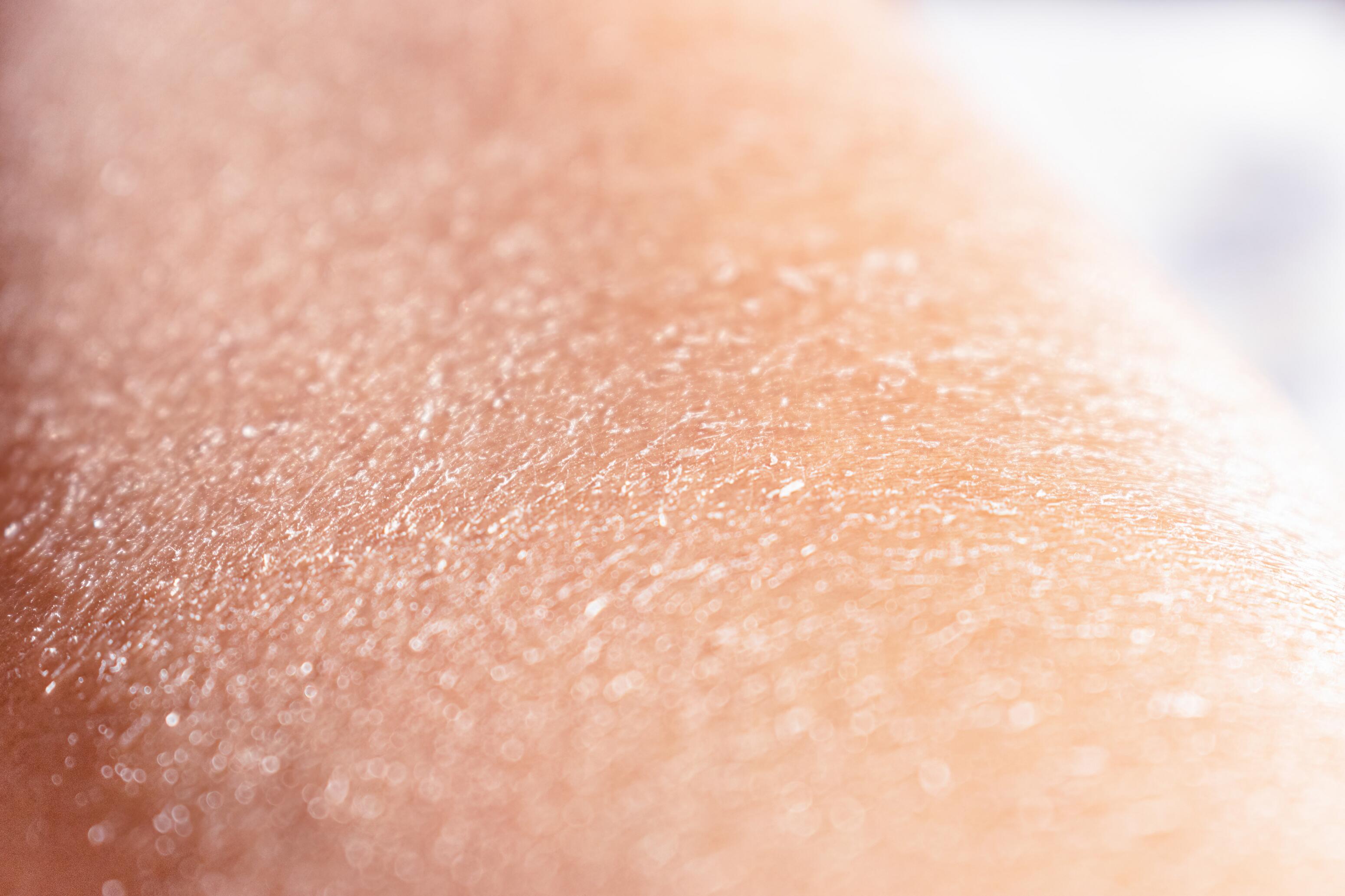
Xerosis or Dry Skin
In eczema, the skin loses its natural hydration, leading to dry skin with a rough texture, flakiness, and sensations of tightness.
How do the symptoms of atopic eczema evolve over time ?¹ ² ³
Atopic dermatitis most often appears in the first months of life. It is then called infant eczema. Subsequently, it alternates between recurrent flare-up periods and symptom-free remission phases. Although its duration varies among individuals, from a few months to several years, most atopic eczema cases improve with age, progressively disappearing during late childhood. 50% of cases thus disappear before age 5, and most before 7.
However, in some cases, symptoms of atopic dermatitis return during adolescence, primarily around skin folds (such as the elbows and behind the knees), with skin thickening (lichenification) and pronounced dryness. In about 10 to 15% of cases, atopic eczema persists into adulthood, presenting characteristics similar to those observed in teenagers. Rarely atopic dermatitis can make its first appearance in adulthood.
Do eczema symptoms vary by age ?
Eczema symptoms can vary significantly by age.

Symptoms in Infants1 2 3 4
Symptoms of infant eczema are characterized by dry, swollen patches, redness, and vesicles (small, fluid-filled bumps). These vesicles on the surface of the patches burst, leading to oozing, which then forms crusts as it dries.
In babies, lesions of atopic dermatitis are symmetrical and typically found on the face (cheeks, forehead, chin, sparing the nose), neck folds, ear folds, scalp, and extensor surfaces of joints (wrists, elbows, ankles, knees). The diaper area is rarely affected but is sensitive to other types of eczema (irritative contact dermatitis, seborrheic dermatitis).
Infant itching may manifest as sleep disturbances, restlessness, and rubbing of cheeks against bed sheets.
Symptoms of Eczema in Children1 2 3
As they grow, lesions become more localized, less weepy, and drier. The itching is often very intense, putting children at risk of scratching lesions and local infectious complications.
Symptoms are less marked on the face as much and tend to be more intense on the flexural folds (anterior face of the elbows, posterior face of the knees). The lower eyelids are often darker and thickened with notable folds (Dennie-Morgan sign). Lesions may also affect the area around the mouth.
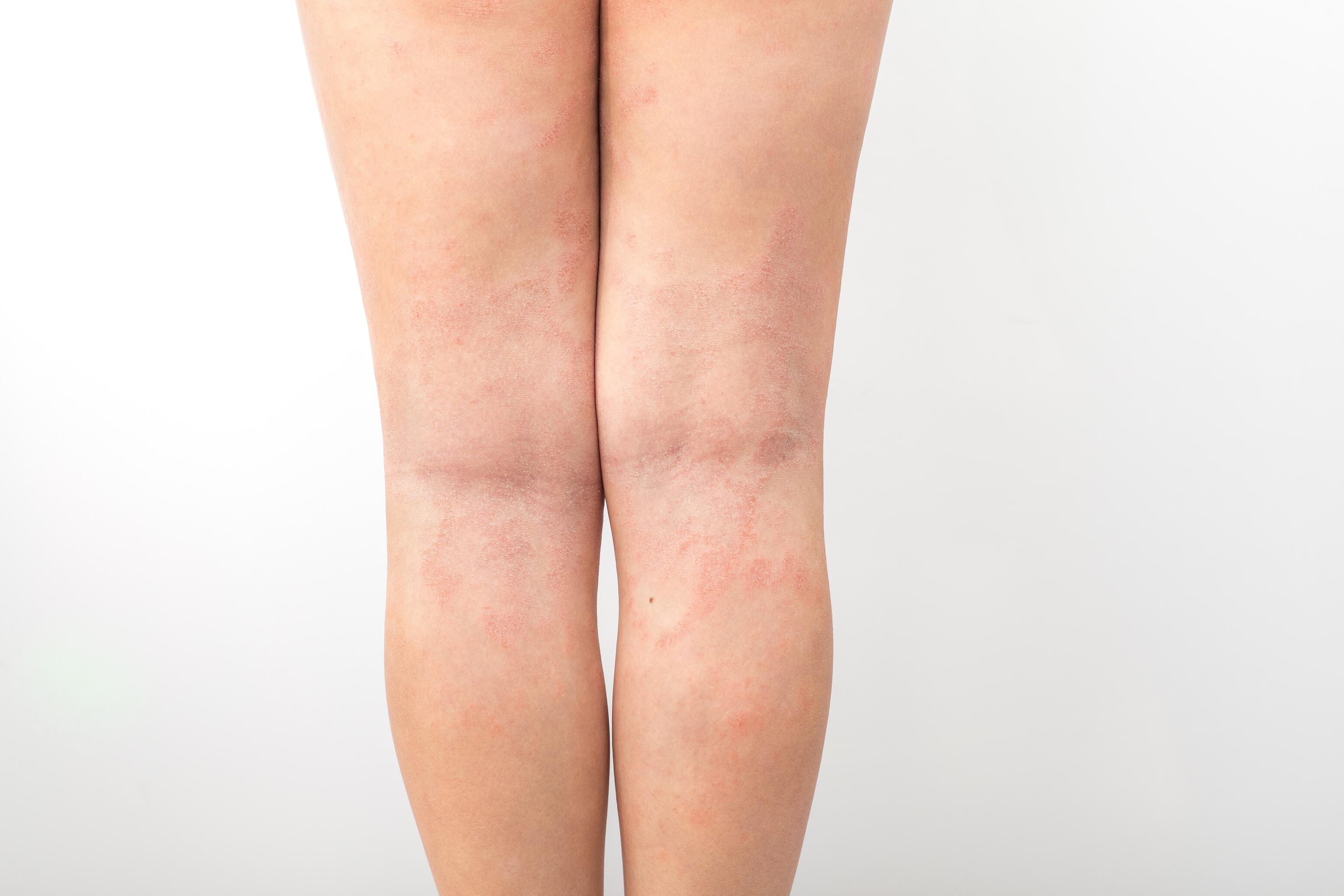
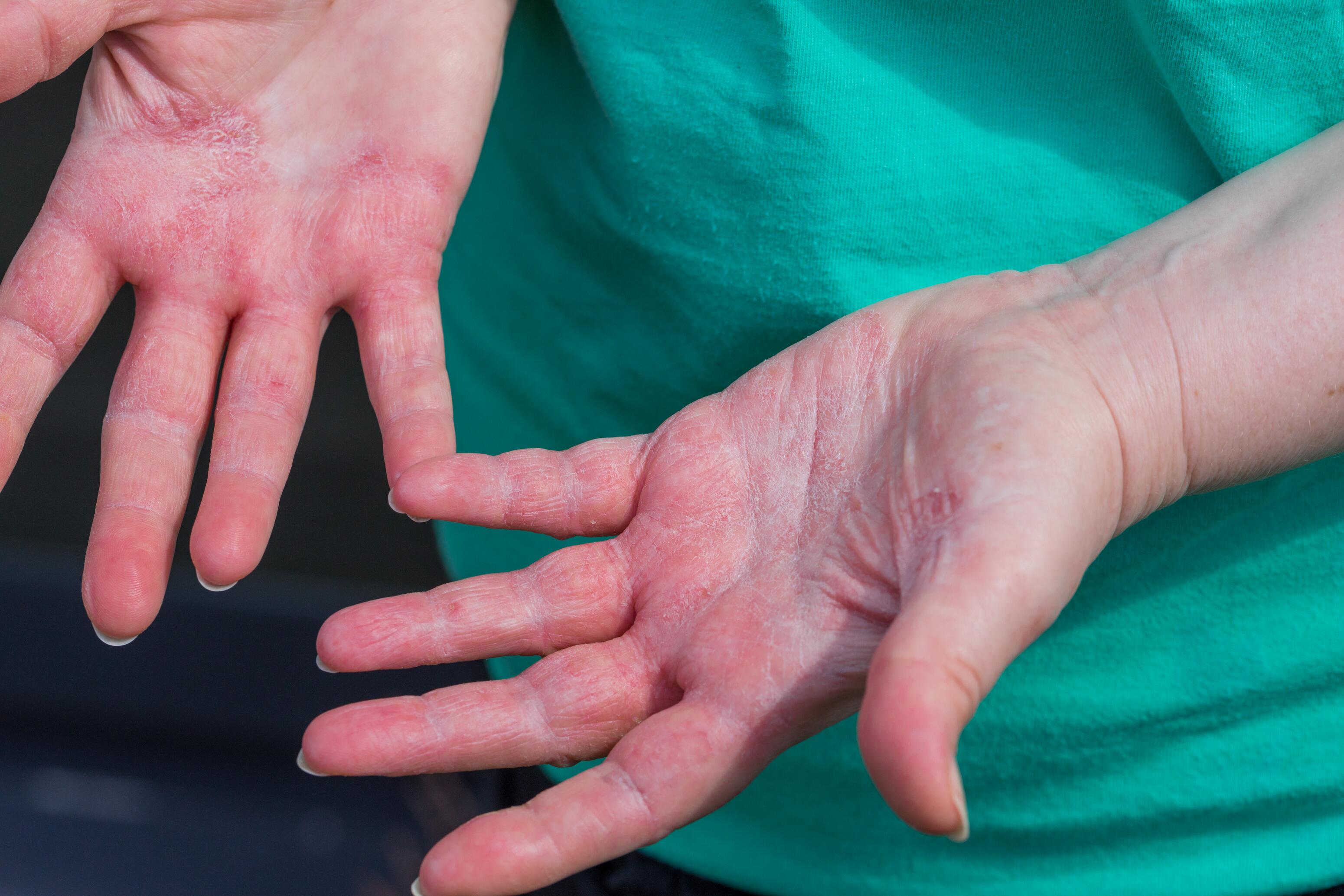
Eczema Manifestations in Adults2 3 5
In adults, chronic lesions become thick with pronounced skin markings (lichenification) and typically predominate on the hands. They are also found on the insides of the elbows and the popliteal fossa (behind the knees).
As atopic eczema is a chronic disease alternating between flare-ups and remissions, it can impair quality of life and have a significant psychological impact on adults, including sleep disturbances and symptoms of anxiety or depression.
Are the symptoms of eczema severe ?
While uncomfortable, eczema symptoms are generally not considered severe. However, eczema can lead to complications and impair quality of life.
What are the complications of eczema?
Infectious Complications
Bacterial Infections1 2 3
90% of patients with atopic dermatitis exhibit excessive skin colonization by Staphylococcus aureus, whereas this bacterium affects only 10% of individuals without eczema. The severity of the dermatitis is often proportional to the density of Staphylococcus aureus on the skin, with a higher risk of infections (impetigo), especially in cases of scratching and abrasions.
Recurrent infections caused by Staphylococcus may require antiseptic or antibiotic treatments to reduce the bacterial load on the skin.

Viral Infections1 2 3
The herpes virus can cause a severe infection during dermatitis flare-ups. Eczema herpeticum is characterized by widespread vesicles, fever, and fatigue. It can lead to severe complications such as keratoconjunctivitis (eye infection), meningitis, or encephalitis (brain infection). For this reason, any child with eczema should avoid close contact with someone who has a "cold sore."
Eczema coxsackie is a hand-foot-mouth disease related to the coxsackievirus A16 occurring in children with atopic dermatitis. It is characterized by widespread vesicles and abrasions in areas affected by atopic dermatitis, possibly with general symptoms such as fever, loss of appetite, and fatigue.
Other Inflammatory Dermatitis
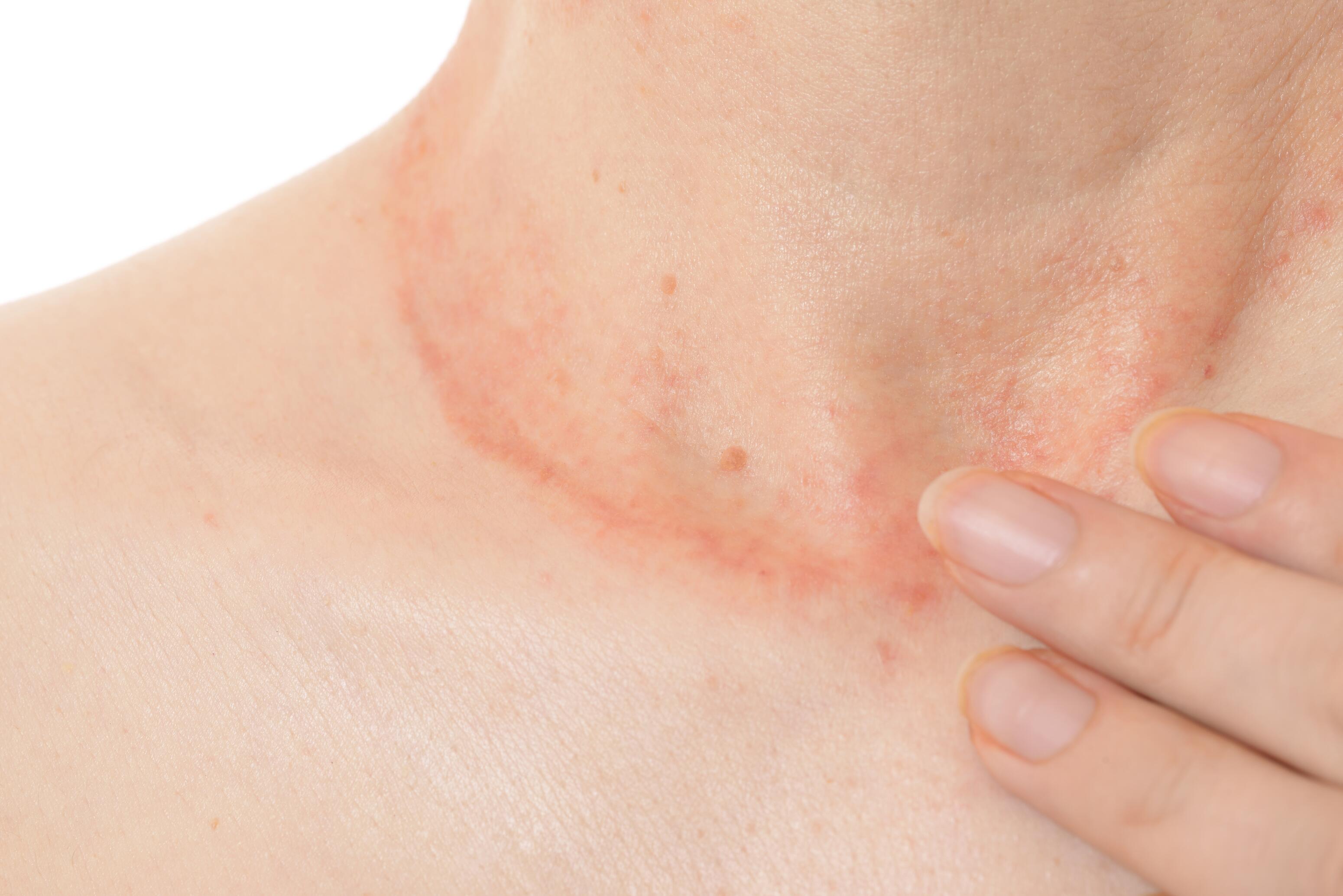
Contact Dermatitis1
Individuals with atopic dermatitis are more likely to develop contact eczema in reaction to certain irritants and allergens, such as fragrances, preservatives, or certain metals.
Chronic Hand Eczema 6
Individuals with contact dermatitis who frequently use water and irritative/allergising products can develop chronic hand eczema.
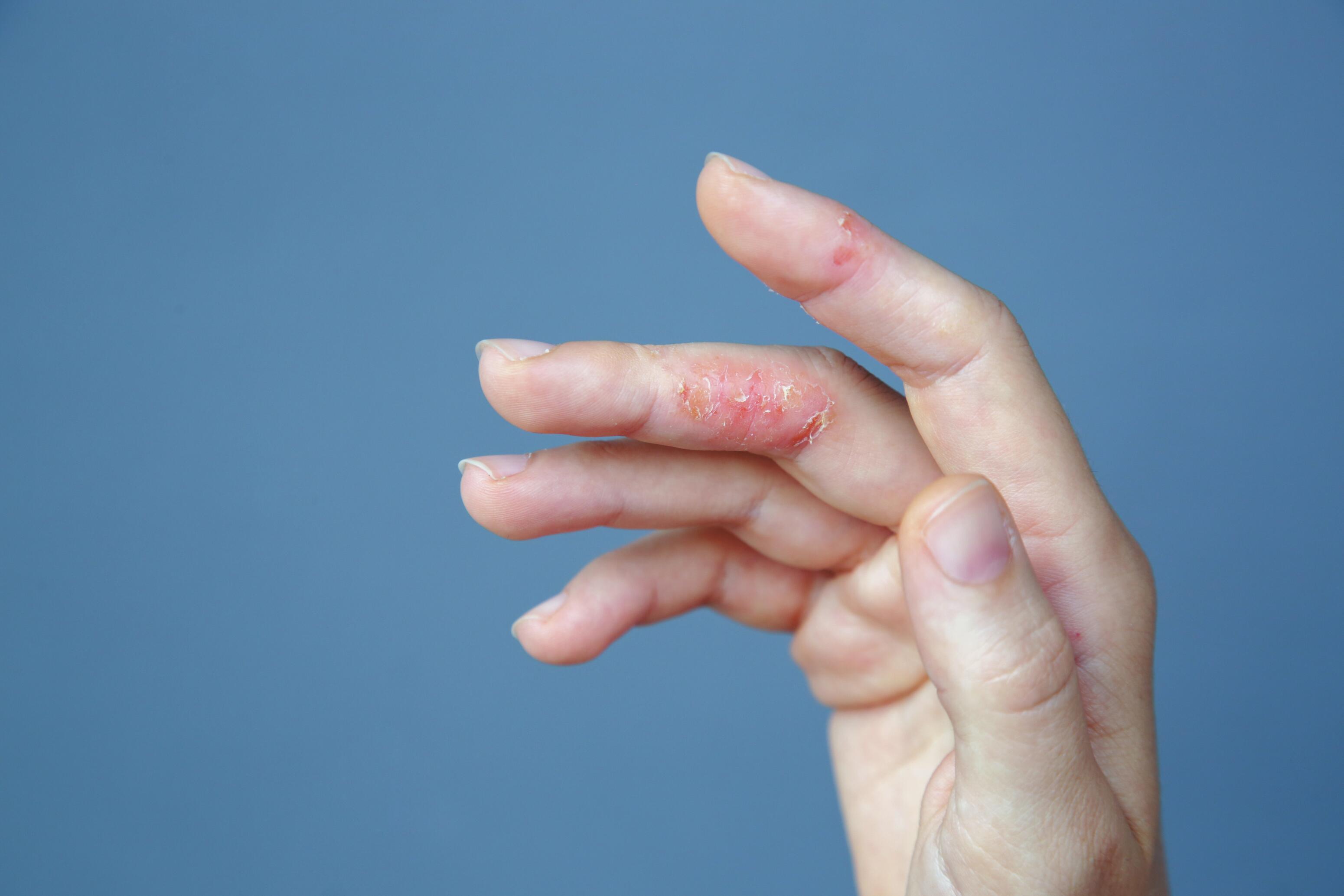
Sleep Disorders and Psychological Issues 1 5
Intense itching can disrupt sleep, leading to fatigue with repercussions on studies or work. The stress associated with managing a chronic disease can impair quality of life and lead to psychological disorders.
Which eczema symptoms should raise alarm?2 3 7
Symptoms Requiring a Doctor Consultation in Infants and Children
Consulting a doctor without delay is crucial if you observe the following signs in your child:
- Despite treatment adherence, changes in the appearance of existing eczema lesions, such as the emergence of unusual pustules or crusts.
- Fever, fatigue, or deterioration of global condition.
- Lack of weight gain in your baby can indicate an underlying food allergy.
- Sleep disturbances.
- Other symptoms of atopy, such as asthma, conjunctivitis or allergic rhinitis.
- Concurrent skin conditions such as scabies, chickenpox, seborrheic dermatitis, or cradle cap.
Symptoms Requiring a Doctor Consultation in Adults
Every case of atopic eczema in adults requires regular medical follow-up. Seek immediate consultation if the eczema impacts your sleep, mood, or social life.
How to Manage Eczema Symptoms ?
Preventing Eczema Itching2 3 7 8
The itch, especially at night, is often the eczema symptom with the most significant impact on quality of life. Here are several strategies for itch prevention:
- Skin Hydration: This is the primary treatment for dry skin during eczema. Out of flare-up apply an emollient over the entire body twice daily, ideally after showering or bathing. Applying an emollient before bed keeps your skin hydrated all night, improving comfort and preventing nocturnal scratching. Choose a product with a simple formula, free from fragrance or parabens, proven effective and validated.
- Avoidance of Allergens and Irritants: Ensure your home is free from allergens and irritants such as dust, mites, pet dander, certain plants, and chemicals.
- Bedding and Clothing: Use natural materials (cotton, linen) for your sheets and clothing. Avoid synthetic or rough fabrics (wool) and wear loose cotton nightwear to reduce skin irritation.
- Ambient Temperature: Keep your home cool and well-ventilated. Sweating can exacerbate itching.
- Prevention of Scratching: Keep your nails short and clean to reduce symptoms related to scratching lesions.
- Medical Consultation: If itching persists, consult a doctor for a tailored treatment such as topical corticosteroids.
FAQ
Typical symptoms of atopic dermatitis include red patches, intense itching of the skin, often on the creases of the elbows, knees and neck, and dryness of the skin (or xerosis). Lesions may ooze, form scabs and thicken over time. In children, it can also affect the face, particularly the cheeks and forehead. Symptoms can vary in severity from person to person and can be exacerbated by triggers such as allergens, skin irritants, stress and temperature changes.
If you notice red patches, intense itching, red eczema-like lesions and dry skin, it's likely that you or your child is suffering from atopic dermatitis. To be sure, we recommend that you consult your doctor or dermatologist.
References
1.L’Assurance Maladie. Eczéma ou dermatite atopique : causes, symptômes et évolution. Ameli.fr. 2023 Sep. [Disponible sur :] https://www.ameli.fr/assure/sante/themes/eczema-atopique/reconnaitre-eczema-atopique
2. Nemeth V, Evans J. Eczema. In: StatPearls. Treasure Island (FL): StatPearls Publishing; 2023 Jan. [Disponible sur :] https://www.ncbi.nlm.nih.gov/books/NBK538209/
3. Kolb L, Ferrer-Bruker SJ. Atopic Dermatitis. In: StatPearls. Treasure Island (FL): StatPearls Publishing; 2023 Jan. [Disponible sur :] https://www.ncbi.nlm.nih.gov/books/NBK448071/
4. Lyons JJ, Milner JD, Stone KD. Atopic dermatitis in children: clinical features, pathophysiology, and treatment. Immunol Allergy Clin North Am. 2015 Feb;35(1):161-83.
5. Arndt J, Smith N, Tausk F. Stress and atopic dermatitis. Curr Allergy Asthma Rep. Juillet 2008;8(4):312-7.
6. Dubin C, Del Duca E, Guttman-Yassky E. Drugs for the Treatment of Chronic Hand Eczema: Successes and Key Challenges. Ther Clin Risk Manag. Décembre 2020;16:1319-1332.
7. L’Assurance Maladie. Que faire et quand consulter. Ameli.fr. 2023 Sep. [Disponible sur :] https://www.ameli.fr/assure/sante/themes/eczema-atopique/que-faire-quand-consulter
8. L’Assurance Maladie. La consultation et le traitement en cas d'eczéma ou dermatite atopique. Ameli.fr. 2023 Sep. [Disponible sur :] https://www.ameli.fr/assure/sante/themes/eczema-atopique/consultation-traitement
- Discover Causes of Eczema: Why Does It Occur and How Can You Prevent It?
Causes of Eczema: Why Does It Occur and How Can You Prevent It?



